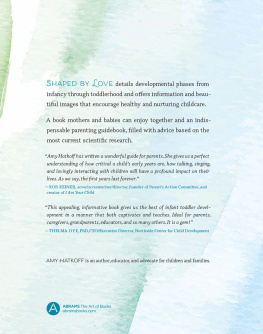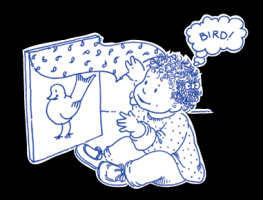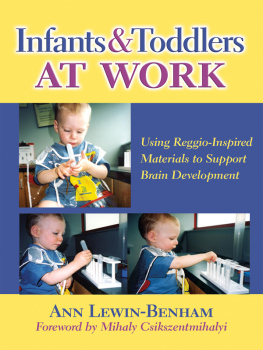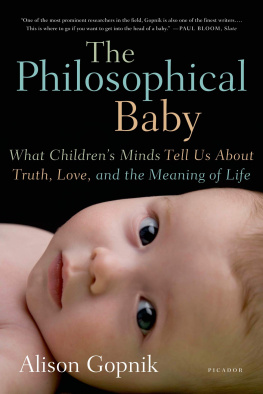F irst off, this book would not have been possible without the support of Tasha, my one true love. She did not roll her eyes at me when I said, I have a new book idea; Redleaf wants to publish it, or I have to go write, and she helped me survive and overcome my first bout with writers block. Thank you.
Thanks also to Tyler, Zo, Siddha, Annie, Lilly, Brenden, Marygrace, Phoebe, Ty, Sam, Hunter, Maddie, Kada, Adrian, Brooke, and all the other infants and toddlers I have known over the years. Watching them learn to know the world made this book possible.
Thanks to Beth Wallace for her willingness to edit another one of my books. The structure, flow, and content all work better thanks to her.
The hard work of the dedicated people at Redleaf Press needs acknowledgment too. Linda Heins work as publisher has reenergized and rejuvenated the Redleaf Press brand. Editors David Heath and Kyra Ostendorf helped refine ideas, provided direction, and gave support when I hit a wall halfway through the first draft. Thanks to the Redleaf production team: Douglas Schmitz, Laurie Herrmann, Laura Maki, Jim Handrigan, and Carla Valadez. Thanks to Jan Grover, Julie Maas, and Laura Weller, your hard work turned my rough manuscript files into this pretty little book. Special thanks to JoAnne Voltz and Inga Weberg, Redleafs marketing manager and sales manager. Not many people would see this book if it were not for your hard work.
Also by Jeff A. Johnson
Do-It-Yourself Early Learning
Everyday Early Learning
Finding Your Smile Again
Keeping Your Smile
Let Them Play
I ts June 19, 1991, at 11:16 in the morning. My son, who will soon be named Tyler, was born sixty seconds ago. I am awestruck by his arrivalso small, so fragile, so perfect, so slimy, so loud. Tasha looked so beautiful; she had been so strong throughout a night of labor. I remember that we waited until after an episode of Cheers ended at 10:30 the night before to head to the hospital because she said there was no need to rush. I remember the doctor asking her to reposition herselfduring a contractionand how she told him in no uncertain terms that he would need to wait a while. I remember trying to be as strong and prepared as she was. I was there, trying to be supportive, but she did all the work.
I had been an adult for a while, but the moment of Tylers birth was the moment I became a grown-up. I realized I was completely unprepared and up to the challenge in the same moment. I realized our planning for his arrival was insufficient and that it really did not matterthings would be okay. I realized all the preparation in the world cannot prepare you to be a parent. What prepares you to be a parent is the first look in your first childs eyes. A room that had moments before been full of pushing and noise was now calm. His dark eyes pierced my heart and changed my life.
In my experience, there are very few single moments you can look back on in life and say, That changed me. Most life change happens gradually, not in a flash of insight and awareness. This was one of those rare change-in-a-flash-of-light moments. His birth not only called forth my hidden potential but also called forth my desire to live up to that potential. I was a dad. We were a family. I was up to the taskwe were up to the task. Things would be okay.
The only problem was that as perfect as he was on the outside, as resolved as I was to do what was right for him, I had no idea what right really looked like. I wanted to make the best choices possible, choices to assure his health, happiness, and well-being in the short and long term. He had a beautiful little head I could not stop looking at, a head full of potential, but I had no idea what was going on in there.
Over the last twenty years working with young children, I have had many opportunities to wonder what is going on in their busy little heads:
Hunter, nearly three years old, has been sitting on the toilet trying to poop for five minutes or so. His skinny arms strain to support his weight. He fidgets, twists from side to side, and hums a happy tune. After a bit, a serious look overtakes him, and his constant motion stops. In the blink of an eye, he reaches one hand between his legs and exclaims, Look, I can poop on my hand!

Siddha, not quite two years old, is upset because someone on the other side of the room has picked up a toy she feels is hers. Her hands are balled into tight little fists at her sides and her teeth are clenched and showing. Her usually wide eyes are now narrow slits. I think I see a bit of steam coming from her ears. If her skin was green and she was wearing ripped purple pants and a tattered shirt, she could pass as the baby version of the Incredible Hulk. Then, in half a second, her usual happy grin, dancing eyes, and peaceful demeanor reappear, and she toddles off to play.
Baby Bryce, happy on his tummy on the infant room floor, is mesmerized by the dance of sunshine and shadows on the wall opposite the window. A large, green, plastic block just out of his reach soon has his attention. As he twists and wiggles, the slowly spinning ceiling fan grabs his attention from the block. He cranes his neck, twists, twists further to improve his view, and all of a sudden flops onto his back. He is startled but happy with his new position. The fan holds his busy little brain captive for a few minutes until someone scoops him up without a word and hauls him to the changing table, where he promptly begins to cry.

The common thread connecting these scenes is a childs attempt at knowing the world. From their very beginnings, children seek meaning; they work to make sense of their world, to sort it into more refined categories, to know what they need to know to survive and thrive. They experiment to gain information and understanding of their physical and social worlds, to comprehend and expand their abilities, to develop tools for coping with varying situations and circumstances. An infant born into a household where English is the predominant language of daily life learns to speak English. An infant born into a household where Cantonese is the principal language develops the skills needed to speak Cantonese. An infant raised in an environment where American Sign Language is the primary language learns American Sign Language.
Infants and toddlers are born scientists, born explorers, born to learn what they need to know to succeed in the environment in which they find themselves. When you look at an infant or toddler and wonder, Whats going on in there? the short answer to your question is learning.
When Hunter pooped on his hand, he was not trying to shock or upset me; he was performing an experiment to help himself better understand his world. Its hard to get inside the mind of a child, but he was probably thinking something like this:







